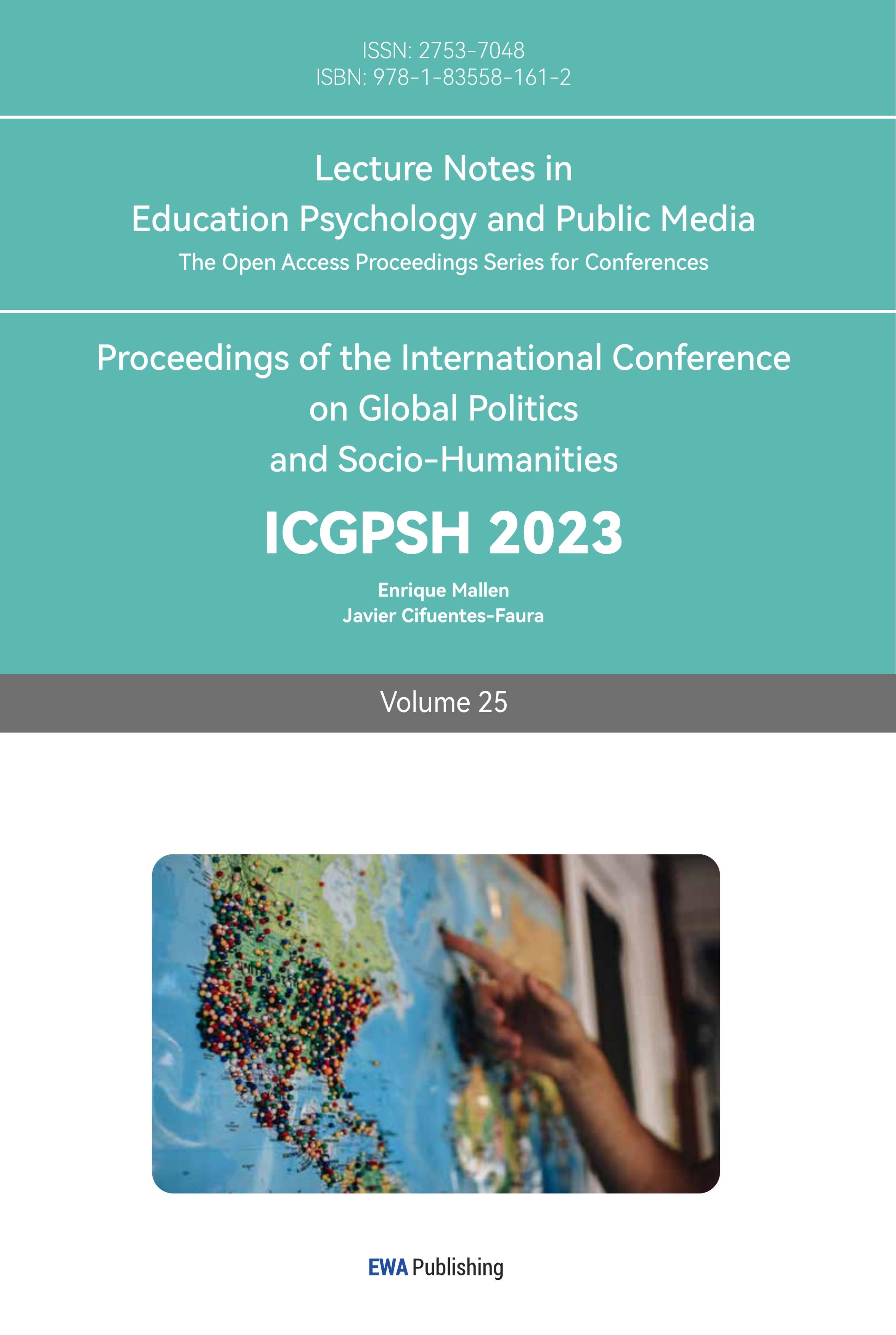References
[1]. Weiner, B. (1992). Human motivation: Metaphors, theories, and research. Newbury Park, CA: Sage.
[2]. Joshi, S., & Acharya, N. (2013). Home environment and achievement motivation of adolescents. Social Science International, 29(1).
[3]. Chen, Q., Kong, Y., Gao, W., & Mo, L. (2018). Effects of socioeconomic status, parent–child relationship, and learning motivation on reading ability. Frontiers in psychology, 9, 1297.
[4]. Iwaniec, J. (2020). The effects of parental education level and school location on language learning motivation. The Language Learning Journal (Education level), 48(4), 427-441.
[5]. Dini, E. S., Wardi, Y., & Sentosa, S. U. (2019, April). The Influence of Parent’s Attention, Parents Education Background, Learning Facilities and Learning Motivation toward Student Learning Achievement. In 2nd Padang International Conference on Education, Economics, Business and Accounting (PICEEBA-2 2018) (pp. 819-827). Atlantis Press.
[6]. Turner, E.A., Chandler, M., & Heffer, R.W. (2009). The Influence of Parenting Styles, Achievement Motivation, and Self-Efficacy on Academic Performance in College Students. Journal of College Student Development 50(3), 337-346. doi:10.1353/csd.0.0073.
[7]. Watabe, A., & Hibbard, D. R. (2014). The Influence of Authoritarian and Authoritative Parenting on Children’s Academic Achievement Motivation: A Comparison between the United States and Japan. North American Journal of Psychology, 16(2).
[8]. Nachoum, R., Moed, A., Madjar, N., & Kanat-Maymon, Y. (2021). Prenatal childbearing motivations, parenting styles, and child adjustment: A longitudinal study. Journal of Family Psychology, 35(6), 715–724. https://doi.org/10.1037/fam0000826
[9]. Guo, X., Peng, Q., Wu, S., Li, Y., Dong, W., Tang, H., ... & Chen, C. (2023). Perceived parenting style and Chinese nursing undergraduates’ learning motivation: The chain mediating roles of self-efficacy and positive coping style. Nurse Education in Practice, 68, 103607.
[10]. Muola, J. M. (2010). A study of the relationship between academic achievement motivation and home environment among standard eight pupils.
Cite this article
Peng,H. (2023). The Impacts of Parenting Style and Education Level of Parents on Learning Motivation. Lecture Notes in Education Psychology and Public Media,25,58-63.
Data availability
The datasets used and/or analyzed during the current study will be available from the authors upon reasonable request.
Disclaimer/Publisher's Note
The statements, opinions and data contained in all publications are solely those of the individual author(s) and contributor(s) and not of EWA Publishing and/or the editor(s). EWA Publishing and/or the editor(s) disclaim responsibility for any injury to people or property resulting from any ideas, methods, instructions or products referred to in the content.
About volume
Volume title: Proceedings of the International Conference on Global Politics and Socio-Humanities
© 2024 by the author(s). Licensee EWA Publishing, Oxford, UK. This article is an open access article distributed under the terms and
conditions of the Creative Commons Attribution (CC BY) license. Authors who
publish this series agree to the following terms:
1. Authors retain copyright and grant the series right of first publication with the work simultaneously licensed under a Creative Commons
Attribution License that allows others to share the work with an acknowledgment of the work's authorship and initial publication in this
series.
2. Authors are able to enter into separate, additional contractual arrangements for the non-exclusive distribution of the series's published
version of the work (e.g., post it to an institutional repository or publish it in a book), with an acknowledgment of its initial
publication in this series.
3. Authors are permitted and encouraged to post their work online (e.g., in institutional repositories or on their website) prior to and
during the submission process, as it can lead to productive exchanges, as well as earlier and greater citation of published work (See
Open access policy for details).
References
[1]. Weiner, B. (1992). Human motivation: Metaphors, theories, and research. Newbury Park, CA: Sage.
[2]. Joshi, S., & Acharya, N. (2013). Home environment and achievement motivation of adolescents. Social Science International, 29(1).
[3]. Chen, Q., Kong, Y., Gao, W., & Mo, L. (2018). Effects of socioeconomic status, parent–child relationship, and learning motivation on reading ability. Frontiers in psychology, 9, 1297.
[4]. Iwaniec, J. (2020). The effects of parental education level and school location on language learning motivation. The Language Learning Journal (Education level), 48(4), 427-441.
[5]. Dini, E. S., Wardi, Y., & Sentosa, S. U. (2019, April). The Influence of Parent’s Attention, Parents Education Background, Learning Facilities and Learning Motivation toward Student Learning Achievement. In 2nd Padang International Conference on Education, Economics, Business and Accounting (PICEEBA-2 2018) (pp. 819-827). Atlantis Press.
[6]. Turner, E.A., Chandler, M., & Heffer, R.W. (2009). The Influence of Parenting Styles, Achievement Motivation, and Self-Efficacy on Academic Performance in College Students. Journal of College Student Development 50(3), 337-346. doi:10.1353/csd.0.0073.
[7]. Watabe, A., & Hibbard, D. R. (2014). The Influence of Authoritarian and Authoritative Parenting on Children’s Academic Achievement Motivation: A Comparison between the United States and Japan. North American Journal of Psychology, 16(2).
[8]. Nachoum, R., Moed, A., Madjar, N., & Kanat-Maymon, Y. (2021). Prenatal childbearing motivations, parenting styles, and child adjustment: A longitudinal study. Journal of Family Psychology, 35(6), 715–724. https://doi.org/10.1037/fam0000826
[9]. Guo, X., Peng, Q., Wu, S., Li, Y., Dong, W., Tang, H., ... & Chen, C. (2023). Perceived parenting style and Chinese nursing undergraduates’ learning motivation: The chain mediating roles of self-efficacy and positive coping style. Nurse Education in Practice, 68, 103607.
[10]. Muola, J. M. (2010). A study of the relationship between academic achievement motivation and home environment among standard eight pupils.









